Broadway by the Year: The Broadway Musicals of 1916-1940
Glorious songs of Berlin, Porter, Gershwin, Kern and operettas were among the canny selections featured in this breezy historical survey concert.
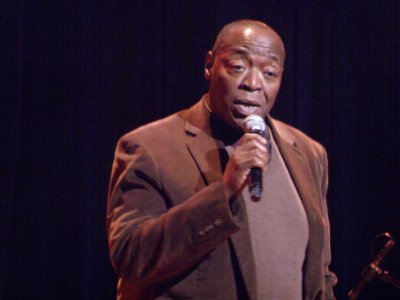
Chuck Cooper as he appeared in “Broadway by The Year: The Broadway Musicals of 1916-1940” (Photo credit: Mary Ann Lopinto)
[avatar user=”Darryl Reilly” size=”96″ align=”left”] Darryl Reilly, Critic[/avatar] Chuck Cooper’s rich, deep voice, commandingly mining the humor of composer George and lyricist Ira Gershwin’s song, “It Ain’t Necessarily So,” from their 1935 musical Porgy and Bess, was among the many highlights of the breezy historical survey concert, Broadway by the Year: The Broadway Musicals of 1916-1940.
It was the opening concert of the 15th season at The Town Hall of creator, writer, and host, Scott Siegel’s series. Each concert covers a 25-year period of Broadway musicals, with one song chosen from a selected show from each year, performed by notable artists. Mr. Siegel stood off to the side at a lectern delivering jocular and informative commentary, and introducing the performers.
W.W. I, The Roaring 20’s, and The Great Depression were reflected in the Broadway musicals of this time period. The concert entertainingly presented these epochs through well-chosen song selections. These were matched appropriately to the traits of its very talented performers. Many of the women wore flapper attire and the men looked dapper.
In a slinky, thin, black dress, patterned with splashes of red and gray, tall, lean, and curly haired Oakley Boycott (“not a stage name” according to the program) was sensational. She turned Irving Berlin’s naughty “You’d Be Surprised,” from Ziegfeld Follies of 1920, into a mini-Bob Fosse-like production number. Gyrating on a stool and swirling a red feather boa, she was visually and vocally stunning with exquisite comic timing as well.
The evening also served as a showcase for the tap dancing, choreographic, and singing talents of the animated Danny Gardner. Berlin’s W.W. I classic song, “Oh, How I Hate to Get Up in The Morning,” from 1918’s Yip Yip Yaphank, was a lively number that he performed with The Broadway by the Year Chorus. Due to a previously announced performer’s illness, he did a special improvised tap number with the band to Berlin’s “Pack up Your Sins and Go to the Devil,” from The Music Box Revue of 1922. The first act finale was another song and tap sequence that he choreographed. That was he and his fiancé Aleka Emerson in a very funny version of the corny, “The Varsity Drag,” from 1927’s Good News.
Steve Ross and Karen Akers, two leading and legendary fixtures of the New York City cabaret world, appeared. Accompanying himself on the piano, he did a simple and very moving rendition of Berlin’s “Say It with Music,” from The Music Box Revue of 1921 at the piano. She did a warm and wistfully nostalgic “Where or When,” from Richard Rodgers and Lorenz Hart’s 1937’s Babes in Arms.
“They Go Wild, Simply Wild,” from 1917’s Irene, was a hilariously jaunty vaudeville style turn by Sidney Myer. Flamboyantly gesturing, he was a divine whirlwind of forceful singing and comedic acting.
Karen Ziemba sang and danced a rollicking, “The Charleston,” from 1923’s Runnin’ Wild. Karen Mason used Cole Porter’s familiar 1934 title song “Anything Goes,” as a springboard to raucous jazziness. Porter was also represented with Stephen Bogardus’ very fine “Night and Day,” from 1932’s The Gay Divorce, and by John Bolton’s pleasant “It’s De-Lovely,” from 1936’s Red, Hot, and Blue. Earlier, Siegel informed the audience that that song was used as a commercial jingle to sell both cars and soft drinks.
Mr. Siegel explained that the rhythm and blues classic, “The Thrill is Gone,” was improbably introduced by Rudy Vallee in George White’s Scandals of 1931, and his recording of it with his band, The Connecticut Yankees, was a big hit. Then Tonya Pinkins powerfully sang it.
He also informed the audience that the 1939 musical comedy Very Warm for May by composer Jerome Kern and lyricist Oscar Hammerstein II ran less than two months. Seeing it inspired the nine-year old Stephen Sondheim’s interest in musical theater. Josh Young skillfully sang its best-known song, “All the Things You Are.”
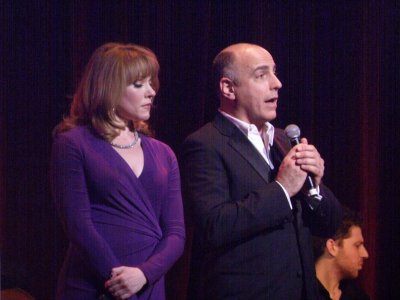
Emily Skinner and William Michals as they sang the duet, “It Never Was You,” from “Knickerbocker Holiday”(Photo credit: Maryann Lopinto)
The operettas of Victor Herbert, Sigmund Romberg and Rudolf Friml were immensely popular in this era and were well represented by exciting performances. John Easterlin sang “Someday,” from 1925’s The Vagabond King and William Michals sang “One Alone” from 1926’s The Desert Song.
In addition to containing numerous standards from The Great American Songbook, the show also had some unfamiliar songs by writers who have fallen into obscurity. Dana Suesse (1909-1987) was an American composer and lyricist who wrote the music for “You Ought to Be in Pictures,” and was dubbed by the press in the 1930’, as “the girl Gershwin.” Here she was represented by the romantic “No, You Can’t Have My Heart,” introduced by Libby Holman in 1938’s You Never Know, and plaintively sung by Emily Skinner. Skinner then sang a stirring duet with William Michals of Kurt Weil and Maxwell Anderson’s “It Never Was You,” from their 1938 show, Knickerbocker Holiday.
Maxine Linehan was marvelously dramatic with Jerome Kern and Otto Harbach’s “Smoke Gets in Your Eyes,” from 1933’s Roberta. Other very fine performances included, Sal Viviano’s “A Hundred Years from Today,” from Blackbirds of 1933, Lumiri Tubo’s “St. Louis Blues,” from Blackbirds of 1928, Nancy Anderson’s “More Than You Know,” from 1929’s Great Day, Carole J. Bufford’s “Body and Soul,” from 1930’s Three’s a Crowd, Liz Larsen’s “Somebody Loves You,” from George Whites’ Scandals of 1924, and Jillian Louis’ “When The Right One Comes Along,” from The Ziegfeld Follies of 1922.
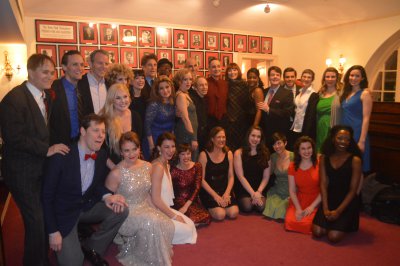
The Cast of “Broadway by the Year: The Broadway Musicals of 1916-1940” (Photo credit: Maryann Lopinto)
In addition to appearing with Danny Gardner in “Oh, How I Hate to Get Up in The Morning,” the youthful and energetic Broadway by the Year Chorus also opened the show with a spirited “Pack Up Your Troubles in Your Old Kit Bag,” from 1916’s Her Soldier Boy, and closed the evening with a rousing “It’s a Lovely Day Tomorrow,” from Irving Berlin’s 1940 Louisiana Purchase.
The virtuosity of The Little Big Band was continuously on display as they performed superbly in a variety of musical styles. Randy Landau on bass and Jamie Eblen on drums were led by musical director and arranger Ross Patterson on piano.
Director Mindy Cooper’s very well executed transitions between the show’s 27 numbers, the personable Scott Siegel’s erudite remarks, and the variety of gifted performers who participated made Broadway by the Year: The Broadway Musicals of 1916-1940 a brisk and very enjoyable event.
Broadway by the Year: The Broadway Musicals of 1916-1940 (February 23rd, 2015)
The Town Hall, 123 W 43rd Street, in Manhattan
For tickets, call 800-982-2787 or visit http://www.thetownhall.org
Running time: two hours and twenty minutes including one intermission

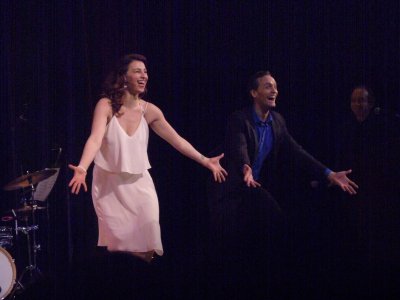
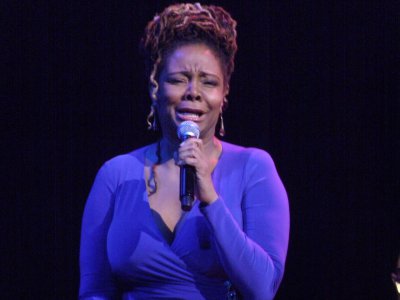





Leave a comment